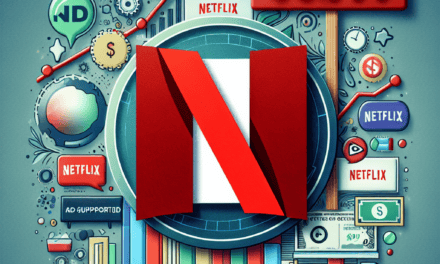“Tech Stocks Tumble: AI Ambitions Spark Investor Jitters at Microsoft and Meta”
Introduction
Tech stocks experienced a notable decline as investor concerns mounted over increased spending on artificial intelligence by major industry players like Microsoft and Meta. Both companies have been at the forefront of integrating AI technologies into their platforms, driving innovation and competition. However, their recent announcements regarding heightened investments in AI development have sparked apprehension among investors, who fear that the substantial financial commitments required could impact short-term profitability. This shift in market sentiment underscores the delicate balance tech giants must maintain between pioneering advancements and managing shareholder expectations. As the AI race intensifies, the broader tech sector faces scrutiny over the sustainability of its growth strategies amidst escalating costs.
Impact Of Increased AI Spending On Tech Stock Valuations
In recent months, the tech industry has witnessed a notable shift in investor sentiment, primarily driven by increased spending on artificial intelligence (AI) by major players such as Microsoft and Meta. This surge in AI investment, while indicative of the growing importance of AI technologies, has raised concerns about the impact on tech stock valuations. As these companies allocate substantial resources towards AI development, investors are becoming increasingly wary of the potential implications for profitability and long-term growth.
To begin with, the heightened focus on AI by tech giants underscores the transformative potential of these technologies. AI is poised to revolutionize various sectors, from healthcare to finance, by enhancing efficiency and enabling new capabilities. Microsoft and Meta, recognizing the strategic importance of AI, have committed significant capital to research and development in this area. However, this increased spending has not been without its consequences. Investors, traditionally attracted to the tech sector for its rapid growth and high returns, are now faced with the challenge of evaluating the long-term benefits of these investments against the immediate financial impact.
Moreover, the substantial financial commitments required for AI development have led to concerns about the sustainability of profit margins. As companies like Microsoft and Meta channel more funds into AI, there is a risk that short-term profitability may be compromised. This is particularly pertinent in an environment where tech stocks are already under pressure due to broader economic uncertainties and rising interest rates. Consequently, investors are scrutinizing the balance sheets of these companies more closely, seeking reassurance that the anticipated returns from AI investments will justify the current expenditure.
In addition to profitability concerns, the increased focus on AI has also raised questions about the competitive landscape within the tech industry. As Microsoft and Meta intensify their AI efforts, other tech companies may feel compelled to follow suit, leading to a potential arms race in AI spending. This scenario could result in a significant shift in market dynamics, with companies that fail to keep pace potentially losing their competitive edge. For investors, this adds another layer of complexity to the decision-making process, as they must now consider not only the financial health of individual companies but also their strategic positioning within the evolving tech ecosystem.
Furthermore, the emphasis on AI spending has implications for the valuation of tech stocks. Traditionally, tech stocks have been valued based on their growth potential and innovation capabilities. However, with increased AI spending, there is a growing need to reassess these valuation metrics. Investors must now weigh the potential for future AI-driven growth against the current financial outlay, a task that requires a nuanced understanding of both the technology and the market. This shift in valuation criteria may lead to increased volatility in tech stock prices, as market participants adjust their expectations in response to new developments.
In conclusion, the increased AI spending by Microsoft and Meta has introduced a new set of challenges for tech stock valuations. While the potential of AI to drive future growth is undeniable, the immediate financial implications of these investments have raised concerns among investors. As the tech industry continues to evolve, it will be crucial for market participants to carefully assess the balance between short-term financial performance and long-term strategic positioning. Ultimately, the ability of tech companies to effectively navigate this landscape will play a critical role in determining their future success and, by extension, the performance of tech stocks in the broader market.
Investor Reactions To Microsoft And Meta’s AI Investment Strategies
In recent weeks, the financial markets have been closely monitoring the movements of major tech stocks, particularly those of Microsoft and Meta, as these industry giants unveil their ambitious plans for increased investment in artificial intelligence (AI). The announcement of these strategies has sparked a wave of reactions among investors, leading to a noticeable dip in tech stock prices. This development underscores the complex relationship between innovation-driven growth and investor sentiment, as stakeholders weigh the potential long-term benefits against immediate financial implications.
Microsoft, a leader in the technology sector, has been at the forefront of AI development, integrating advanced AI capabilities into its suite of products and services. The company’s recent decision to significantly boost its AI spending reflects its commitment to maintaining a competitive edge in this rapidly evolving field. However, this move has not been without its challenges. Investors are expressing concerns about the substantial financial outlay required to support such initiatives, particularly in an economic climate marked by uncertainty and fluctuating market conditions. The apprehension stems from the potential impact on Microsoft’s short-term profitability, as increased expenditure could pressure its bottom line.
Similarly, Meta, formerly known as Facebook, has also announced plans to ramp up its investment in AI technologies. The company is focusing on leveraging AI to enhance user experiences across its platforms, as well as to drive innovation in areas such as virtual reality and the metaverse. While these initiatives hold promise for future growth, they also entail significant costs. Investors are wary of the financial burden associated with these ambitious projects, especially given Meta’s recent challenges in navigating regulatory scrutiny and public perception issues. The market’s reaction to Meta’s AI investment strategy highlights the delicate balance between pursuing transformative technologies and maintaining investor confidence.
As both Microsoft and Meta chart their respective courses in the AI landscape, the broader tech sector is experiencing a ripple effect. The dip in tech stocks is indicative of a cautious approach adopted by investors, who are keenly assessing the potential risks and rewards associated with these companies’ strategic decisions. This cautious sentiment is further compounded by external factors, such as global economic uncertainties and geopolitical tensions, which continue to influence market dynamics.
Despite the immediate concerns, it is important to recognize the long-term potential of AI investments. Both Microsoft and Meta are positioning themselves to capitalize on the transformative power of AI, which is expected to drive significant advancements across various industries. By investing in AI, these companies are not only enhancing their product offerings but also paving the way for new revenue streams and business models. This forward-looking approach, while requiring substantial upfront investment, has the potential to yield substantial returns in the future.
In conclusion, the recent dip in tech stocks following Microsoft and Meta’s announcements of increased AI spending reflects a complex interplay of investor sentiment and strategic foresight. While the immediate financial implications have raised concerns, the long-term potential of AI-driven innovation cannot be overlooked. As these tech giants continue to navigate the challenges and opportunities presented by AI, investors will be closely watching their progress, weighing the risks against the promise of future growth. Ultimately, the success of these strategies will depend on the companies’ ability to effectively manage their investments while delivering tangible value to shareholders.
Long-term Implications Of AI Investments On Tech Industry Growth
The recent dip in tech stocks, particularly those of industry giants like Microsoft and Meta, has sparked a wave of concern among investors and analysts alike. This downturn is largely attributed to the companies’ increased spending on artificial intelligence (AI) initiatives, which, while promising in potential, have raised questions about the long-term implications for growth within the tech industry. As these corporations channel substantial resources into AI development, the immediate financial impact is evident in their stock performance. However, it is crucial to consider the broader context and future prospects that such investments might entail.
To begin with, the surge in AI spending by Microsoft and Meta underscores a strategic pivot towards harnessing the transformative power of AI technologies. These investments are not merely expenditures but are seen as essential steps in maintaining competitive advantage in an increasingly AI-driven market. The rationale behind this shift is clear: AI has the potential to revolutionize various sectors, from healthcare to finance, by enhancing efficiency, accuracy, and innovation. Consequently, companies that lead in AI development are likely to set the pace for future technological advancements.
Nevertheless, the immediate financial implications of these investments cannot be overlooked. The substantial capital required for AI research and development, infrastructure, and talent acquisition has led to increased operational costs. This, in turn, has affected profit margins and, subsequently, stock valuations. Investors, traditionally focused on short-term returns, may view this as a cause for concern, prompting a sell-off in tech stocks. However, it is essential to recognize that such fluctuations are often part of the natural cycle of innovation-driven industries.
Moreover, the long-term benefits of AI investments could potentially outweigh the short-term financial setbacks. As AI technologies mature, they are expected to unlock new revenue streams and create efficiencies that could significantly enhance profitability. For instance, AI-driven automation can reduce operational costs, while AI-powered analytics can provide deeper insights into consumer behavior, enabling more targeted marketing strategies. These advancements could lead to increased market share and higher returns on investment in the long run.
Furthermore, the commitment of tech giants like Microsoft and Meta to AI development could stimulate broader industry growth. By setting a precedent, these companies encourage other players in the tech sector to invest in AI, fostering an environment of innovation and collaboration. This collective effort could accelerate the pace of AI advancements, leading to breakthroughs that benefit not only individual companies but the industry as a whole.
In addition, the societal implications of AI investments should not be underestimated. As AI technologies become more integrated into daily life, they have the potential to address complex global challenges, such as climate change and healthcare accessibility. By investing in AI, tech companies are not only positioning themselves for future growth but also contributing to solutions that could have far-reaching positive impacts on society.
In conclusion, while the current dip in tech stocks may raise concerns about the financial impact of increased AI spending, it is important to consider the long-term implications of these investments. The potential for AI to drive innovation, efficiency, and societal progress suggests that the tech industry’s commitment to AI development could ultimately lead to sustained growth and transformation. As such, stakeholders should adopt a forward-looking perspective, recognizing that the path to technological advancement often involves navigating short-term challenges for long-term gains.
Analyzing The Financial Risks Of AI Spending For Tech Giants

In recent months, the financial markets have been closely monitoring the performance of tech stocks, particularly those of industry giants like Microsoft and Meta. These companies, which have long been at the forefront of technological innovation, are now facing increased scrutiny as they ramp up spending on artificial intelligence (AI) initiatives. This surge in investment, while indicative of a commitment to future growth and technological advancement, has raised concerns among investors about the potential financial risks associated with such expenditures.
To begin with, the substantial increase in AI spending by Microsoft and Meta reflects their strategic focus on integrating AI into their core operations and product offerings. Microsoft, for instance, has been investing heavily in AI to enhance its cloud services, productivity tools, and other software solutions. Similarly, Meta, formerly known as Facebook, is channeling significant resources into AI to support its ambitious vision of the metaverse, a virtual reality space where users can interact in a computer-generated environment. These investments are seen as essential for maintaining competitive advantage in an increasingly AI-driven world.
However, the financial implications of these investments cannot be overlooked. The tech sector is known for its rapid pace of change, and the success of AI initiatives is not guaranteed. Investors are wary of the high costs associated with AI research and development, which can strain a company’s financial resources. Moreover, the return on investment for AI projects can be uncertain, as the technology is still evolving and its commercial applications are not fully realized. This uncertainty has led to a dip in tech stocks, as market participants reassess the risk-reward balance of investing in companies with significant AI expenditure.
Furthermore, the competitive landscape in the AI domain is intensifying, with numerous players vying for dominance. This competition necessitates continuous investment in AI capabilities, which can further pressure profit margins. Companies like Microsoft and Meta must not only invest in developing cutting-edge AI technologies but also in acquiring talent and infrastructure to support these initiatives. The costs associated with attracting top AI researchers and building state-of-the-art data centers are substantial, adding another layer of financial risk.
In addition to these challenges, regulatory scrutiny is an emerging concern. As AI technologies become more pervasive, governments worldwide are considering regulations to address issues such as data privacy, algorithmic bias, and ethical use of AI. Compliance with these regulations could entail additional costs for tech companies, further impacting their financial performance. Investors are keenly aware of these potential regulatory hurdles and are factoring them into their assessments of tech stocks.
Despite these concerns, it is important to recognize that AI also presents significant opportunities for growth and innovation. Companies that successfully harness AI can unlock new revenue streams, improve operational efficiencies, and deliver enhanced customer experiences. For Microsoft and Meta, the challenge lies in balancing the immediate financial risks with the long-term potential benefits of AI. By strategically managing their AI investments and demonstrating clear pathways to profitability, these tech giants can reassure investors and stabilize their stock performance.
In conclusion, while the increased AI spending by Microsoft and Meta has raised financial concerns, it also underscores their commitment to leading the next wave of technological innovation. The dip in tech stocks reflects a cautious market response to the inherent risks of AI investment. However, with careful management and strategic foresight, these companies have the potential to turn their AI ambitions into substantial financial gains, ultimately benefiting both their shareholders and the broader tech ecosystem.
How AI Spending Trends Are Shaping The Future Of Tech Stocks
In recent months, the technology sector has witnessed a notable shift in investor sentiment, primarily driven by the escalating expenditures on artificial intelligence (AI) by major tech giants such as Microsoft and Meta. This trend has sparked concerns among investors, leading to a dip in tech stocks as market participants reassess the long-term implications of these spending patterns. As companies increasingly allocate substantial resources towards AI development, the financial community is grappling with the potential impact on profitability and the broader market landscape.
To begin with, the surge in AI spending by Microsoft and Meta underscores the strategic importance these companies place on artificial intelligence as a cornerstone of future growth. Microsoft, for instance, has been aggressively investing in AI to enhance its cloud computing capabilities and integrate AI-driven solutions across its product offerings. Similarly, Meta, formerly known as Facebook, is channeling significant funds into AI research to bolster its metaverse ambitions and improve user experiences on its platforms. While these investments are indicative of a forward-looking approach, they also raise questions about the immediate financial burden and the timeline for realizing returns.
Moreover, the increased focus on AI spending is not isolated to Microsoft and Meta. It reflects a broader industry trend where tech companies are vying to secure a competitive edge in the rapidly evolving digital landscape. This race to innovate has led to a surge in research and development expenditures, which, while essential for long-term growth, can strain short-term financial performance. Consequently, investors are becoming increasingly cautious, as they weigh the potential benefits of AI advancements against the risks associated with heightened spending.
In addition to the financial implications, the emphasis on AI spending is reshaping the competitive dynamics within the tech sector. Companies that successfully harness AI technologies are likely to gain a significant advantage, potentially disrupting traditional business models and creating new market leaders. However, this also means that firms unable to keep pace with AI advancements may find themselves at a disadvantage, leading to a potential realignment of market positions. As a result, investors are closely monitoring how these spending trends influence the competitive landscape and the relative positioning of tech companies.
Furthermore, the dip in tech stocks can also be attributed to broader macroeconomic factors that are amplifying investor concerns. Rising interest rates and inflationary pressures have heightened market volatility, prompting investors to adopt a more cautious approach towards high-growth sectors like technology. In this context, the substantial AI investments by Microsoft and Meta are being scrutinized not only for their strategic value but also for their impact on financial stability in an uncertain economic environment.
In conclusion, the recent dip in tech stocks, driven by concerns over AI spending by major players like Microsoft and Meta, highlights the complex interplay between innovation and financial performance. While these investments are crucial for maintaining a competitive edge in the digital age, they also pose challenges in terms of balancing short-term financial health with long-term strategic goals. As the tech sector continues to navigate this evolving landscape, investors will need to carefully assess the implications of AI spending trends, considering both the potential for transformative growth and the risks associated with increased expenditures. Ultimately, the future of tech stocks will be shaped by how effectively companies manage this delicate balance, ensuring that AI investments translate into sustainable value creation.
Comparing AI Investment Approaches Of Microsoft And Meta
In recent months, the technology sector has witnessed a notable dip in stock prices, primarily driven by concerns over increased spending on artificial intelligence (AI) by major players such as Microsoft and Meta. As these tech giants continue to invest heavily in AI, investors are becoming increasingly wary of the potential impact on their financial performance. This has led to a broader discussion about the differing approaches to AI investment adopted by Microsoft and Meta, and how these strategies might influence their long-term success.
Microsoft, a stalwart in the technology industry, has long been at the forefront of AI development. The company has consistently integrated AI into its existing products and services, such as Azure, Office 365, and Dynamics 365, to enhance functionality and improve user experience. Recently, Microsoft announced plans to further increase its AI spending, focusing on expanding its cloud-based AI services and developing new AI-driven solutions. This approach underscores Microsoft’s commitment to leveraging AI as a means of driving growth across its diverse product portfolio. However, the increased expenditure has raised concerns among investors about the potential for diminishing returns, especially in a competitive market where innovation is both costly and uncertain.
In contrast, Meta, formerly known as Facebook, has adopted a more ambitious and expansive approach to AI investment. The company has been channeling significant resources into developing AI technologies that can support its vision of the metaverse—a virtual reality space where users can interact with a computer-generated environment and other users. Meta’s AI initiatives are aimed at creating more immersive and interactive experiences, which the company believes will be central to the future of social interaction and digital commerce. While this bold strategy has the potential to revolutionize the way people connect and engage online, it also carries substantial risks. The metaverse is still in its nascent stages, and the path to monetization remains unclear, leading to investor apprehension about the long-term viability of such a significant financial commitment.
Despite these differences, both Microsoft and Meta share a common challenge: balancing the need for innovation with the expectations of their shareholders. As they continue to pour resources into AI, they must demonstrate that these investments will yield tangible benefits and drive sustainable growth. This requires not only technological advancements but also strategic foresight to anticipate market trends and consumer demands.
Moreover, the broader economic environment adds another layer of complexity to the situation. With inflationary pressures and potential interest rate hikes on the horizon, investors are becoming more cautious about companies with high capital expenditures. This has contributed to the recent dip in tech stocks, as market participants reassess the risk-reward profiles of firms with substantial AI investments.
In conclusion, the contrasting AI investment approaches of Microsoft and Meta highlight the diverse strategies that tech companies are employing to navigate the rapidly evolving digital landscape. While Microsoft’s focus on integrating AI into its existing ecosystem offers a more measured path to growth, Meta’s ambitious pursuit of the metaverse represents a high-stakes gamble on the future of digital interaction. As these companies continue to refine their strategies, the tech industry—and its investors—will be closely watching to see which approach ultimately proves more successful in harnessing the transformative potential of AI.
Market Volatility: Tech Stocks’ Response To AI Budget Increases
In recent weeks, the technology sector has experienced notable volatility, primarily driven by concerns over increased spending on artificial intelligence (AI) by major players such as Microsoft and Meta. Investors, who have long been optimistic about the potential of AI to drive future growth, are now expressing apprehension over the substantial financial commitments these companies are making. This shift in sentiment has led to a dip in tech stocks, as market participants reassess the balance between short-term costs and long-term benefits.
Microsoft, a leader in the AI space, recently announced plans to significantly boost its investment in AI research and development. While the company has consistently demonstrated its ability to integrate AI into its product offerings, the scale of the new investment has raised eyebrows. Investors are concerned that the increased expenditure could weigh on Microsoft’s profit margins in the near term. Moreover, the competitive landscape is intensifying, with numerous tech giants vying for dominance in the AI arena. This competition necessitates substantial financial outlays, further fueling investor anxiety.
Similarly, Meta, formerly known as Facebook, has also committed to ramping up its AI spending. The company is focusing on leveraging AI to enhance its social media platforms and develop new virtual and augmented reality experiences. While these initiatives hold promise for future revenue streams, they require significant upfront investment. Meta’s decision to allocate more resources to AI has sparked debate among investors about the potential impact on its financial performance. The company’s recent rebranding and strategic pivot towards the metaverse have already introduced a degree of uncertainty, and the added financial burden of increased AI spending compounds these concerns.
As a result of these developments, tech stocks have experienced a noticeable decline. The market’s reaction underscores the delicate balance that companies must strike between investing in future growth and maintaining current profitability. Investors are increasingly scrutinizing the financial implications of AI investments, particularly in an environment where interest rates are rising and economic conditions are uncertain. The heightened focus on fiscal discipline reflects a broader trend in the market, where investors are prioritizing companies with clear paths to profitability.
Despite the current dip in tech stocks, it is important to recognize the long-term potential of AI. The technology is poised to revolutionize various industries, from healthcare to finance, offering significant opportunities for companies that can successfully harness its capabilities. However, the path to realizing these benefits is fraught with challenges, including the need for substantial investment in research, talent acquisition, and infrastructure development. Companies like Microsoft and Meta are betting on their ability to navigate these challenges and emerge as leaders in the AI-driven future.
In conclusion, the recent dip in tech stocks highlights the market’s cautious stance towards increased AI spending by major technology companies. While the long-term potential of AI remains promising, investors are grappling with the immediate financial implications of these investments. As Microsoft, Meta, and their peers continue to allocate resources towards AI development, they must carefully manage investor expectations and demonstrate a clear strategy for balancing growth with profitability. The coming months will be crucial in determining how these companies navigate the evolving landscape and whether they can assuage investor concerns while capitalizing on the transformative power of AI.
Q&A
1. **Question:** What recent event has caused tech stocks to dip?
– **Answer:** Tech stocks dipped due to concerns raised by Microsoft and Meta about increased spending on AI.
2. **Question:** Which companies are primarily involved in raising concerns about AI spending?
– **Answer:** Microsoft and Meta are the companies primarily involved.
3. **Question:** What specific aspect of AI is causing concern among investors?
– **Answer:** The increased spending on AI development and implementation is causing concern.
4. **Question:** How have Microsoft and Meta’s financial strategies impacted their stock prices?
– **Answer:** Their strategies to increase AI spending have led to a dip in their stock prices.
5. **Question:** What is the general sentiment among investors regarding AI spending by tech companies?
– **Answer:** Investors are concerned about the high costs and potential risks associated with increased AI spending.
6. **Question:** How might increased AI spending affect the future profitability of tech companies like Microsoft and Meta?
– **Answer:** Increased AI spending could strain short-term profitability but may lead to long-term gains if successful.
7. **Question:** What are some potential risks associated with high AI spending for tech companies?
– **Answer:** Potential risks include overspending, delayed returns on investment, and the possibility of not achieving expected technological advancements.
Conclusion
The recent dip in tech stocks, triggered by Microsoft and Meta’s increased spending on AI, underscores investor concerns about the sustainability of high expenditure in the rapidly evolving AI sector. While these tech giants are investing heavily to maintain competitive advantages and drive future growth, the immediate impact on profitability and the uncertainty surrounding the return on these investments have led to market apprehension. This situation highlights the delicate balance companies must strike between innovation and financial prudence, as well as the broader market’s sensitivity to shifts in strategic focus within the tech industry.





